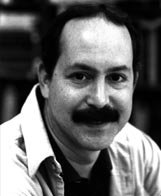PASADENA—Elliot Meyerowitz, a specialist in the genetics of flowering plants, has been named chair of the Division of Biology at the California Institute of Technology. The announcement was made by Steven Koonin, vice president and provost.
Meyerowitz replaces Mel Simon, who is returning to full-time faculty and research duties after serving five years in the office. The appointment becomes effective July 1, and has been approved by the Caltech Board of Trustees.
"A faculty search committee strongly recommended that Elliot Meyerowitz succeed Mel Simon," Koonin said on announcing the appointment. "Elliot is widely respected for his intellect and scientific accomplishments and his demonstrated administrative ability as Executive Officer for Biology.
"The Institute is very fortunate that someone of his caliber has agreed to assume administrative responsibilities," Koonin said.
Meyerowitz, a professor of and current executive officer for biology, has been a member of the Caltech faculty since 1980. His primary research interest is the genes that control the formation of flowers, and how altering these genes will affect flower development. He has identified mutations that cause petal cells to develop into stamens instead, and another mutation that causes these same embryonic petals to become sepals.
Meyerowitz earned his bachelor's degree in biology, summa cum laude, at Columbia University in 1973, and his doctorate at Yale University in 1977. He received the John S. Nicholas Award for Outstanding Biology Dissertation from Yale for his doctoral research. Following a postdoctoral appointment at Stanford, he joined the Caltech faculty as an assistant professor, and was appointed full professor in 1989.
Among his awards is the 1996 "Science pour l'Art" Science Prize, for which he was corecipient, and which was presented in Paris by the firm LVMH—Moët HennessyoLouis Vuitton. The award is presented annually to researchers whose science is of aesthetic and artistic merit.
Meyerowitz also won the Genetics Society of America Medal in 1996, the Gibbs Medal from the American Society of Plant Physiologists in 1995, and the Pelton Award from the Botanical Society of America and the Conservation Research Foundation in 1994.
He was elected to membership in the National Academy of Sciences in 1995, the American Academy of Arts and Sciences in 1991, and the American Philosophical Society in 1998. He was winner of the Richard Lounsbery Award of the National Academy of Sciences in 1999, and received a Sloan Foundation Research Fellowship in 1981.
 Dr. Elliot Meyerowitz
Dr. Elliot Meyerowitz
 Dr. Elliot Meyerowitz
Dr. Elliot Meyerowitz
 Dr. Elliot Meyerowitz
Dr. Elliot Meyerowitz
 Dr. Elliot Meyerowitz
Dr. Elliot Meyerowitz
